Herbal healers IX
Herbal healers IX
Nirgundi
Scientific name : Vitex negundo
Family : Vrbinaceae
Vernacular name
- Assam : Aslak
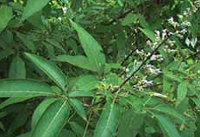
- Bengali : Nirgundi, Nishinda
- English : Five Leaved Chaste tree
- Gujarati : Nagod
- Hindi : Nirgundi, Sinduar, Sambhalu
- Kannada : Lakkigida, Nekkigida
- Malayalam : Indranee, Nirgundi
- Marathi : Nirgundi
- Punjabi : Sambhalu, Banna
- Tamil : Karunochchi, Nocchi
- Telugu : Nallavavilli, Vavili
- Urdu : Sambhalu, Panjangusht
Medicinal Uses
- Joint pains: Take 20 nirgundi leaves and cut into small pieces. Put into a pan,slightly warm leaves by adding sesame oil and applied over the joint with cotton cloth bandage. This kind of poutlies are helpful to relieve the joint pain and swelling.
- Cough: Consume the Nirgundi leaf decoction (10 gms of leaves paste boiled in 100m of water and reduced into 1/4th) twice or thrice daily is pacifies cough, throat irritation, fever, URTI etc.
- Wounds: The freshly prepared nirgundi leaf decoction (20 gms leaf paste boiled in 200 ml of water and reduced into 1/4th) is used to wash the wounds and helps in early healing .
- Nasal polyps: Internal administration of 3gms of fruit powder with warm water daily once is cures disorders of nasal passages, especially rhinitis and nasal polyps.
- Low back ache: 50 gram of Nirgundi leaves , 200 ml of sesame oil and 800 ml of water or leaf decoction/ fresh juice are taken together and oil is cooked until free of moisture. This oil is used to apply over the joints and painful area of low back acts as very good analgesic and anti inflammatory .
- Splenomegaly: 20-30 ml of leaf juice along with the same quantity of cows urine is mixed and given early morning for spleenomegally for 2-3 month. Also external application of the leaf paste over the inflammed spleen area also beneficial.
- Puerperal disorders: 3gms of nirgundi leaf paste, 3gms of garlic clove paste, 3gms of dry ginger powder and 2 gms of pippali powder boiled in 100 ml of water and reduced to 25ml. Intake of this decoction daily once for 15 days after delivery, will destroys all disorders caused in puerperal stage.
Palandu
Scientific name : Allium cepa
Family : Liliaceae
Vernacular name
- English : Onion
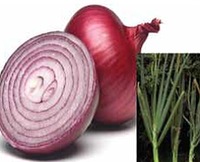
- Hindi : Piaz, Piyaj, Piyaz,
- Kannada : Eerulli, Irulli, Kunbali, Neerulli, Nirulli, Ullagaddi
- Malayalam : Bawang, Ceriyaulli, Cuvannulli, Eerulli,
- Marathi : Kamdo, Kanda, Kandaa, Piyav
- Telugu : Ulligadda, Erragaddalu
- Tamil : Vengayam
Medicinal Uses
- Bleeding piles: 20ml of raw white onion juice should be taken on an empty stomach daily in the morning.
- High Cholesterol: Take half a cup of raw onion juice mixed with one teaspoonful of honey and ginger juice; this reduces the bad cholesterol levels in the blood.
- Vision: Internal administration of the juice of onion in a dose of 10- 15ml daily is beneficial to improve the vision.
- Cough: The slices of onion is fried in ghee and taken internally is beneficial to treat cough.
- Nasal bleeding: White onion juice 2-3 drops is installed into nostrils.
- Dental caries: The paste of onion is kept over the area affected with dental caries and inflammation of the gum.
Palasha
Scientific name : Butea monosperma
Family : Fabaceae
Vernacular name
- Bengali : Palash Gachha, Palash, Palas
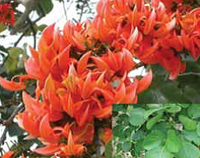
- English : Bastard peak
- Gujarati : Kesudo, Khakharo, Khakhapado
- Hindi : Dhak, Tesu
- Kannada : Muttug, Muttuga, Muttala
- Malayalam : Plasu, Camata, Plas, Chama Tha
- Marathi : Palas
- Punjabi : Palash, Dhak, Tesu
- Tamil : Purasu, Paras
- Telugu : Moduga
- Urdu : Dhak, Palaspapda
Medicinal Uses
- Menstrual irregularities: 10-15 gram of Palasha bark is taken and decoction is made. This is taken twice daily for 12-14 days prior to expected date of menstruation. This should be carried till the date of menstruation. The medication is continued for three consecutive cycles. Flowers of palasa 160gms mixed with double sugar should be taken with milk twice daily also beneficial in Menstrual irregularities.
- Intestinal worms: 1-2 gram for children and 4-5 grams for adults of Palash Seed powder along with warm water. This helps to check the repeated episodes of intestinal worms.
- Piles: The Palash resin (oozed out from the stem of the tree) is taken 2-3 gram and mixed with warm water and administered, especially to the children. This pacifies haemorrhoids quite effectively.
- Skin discoloration: Fresh flowers paste is applied over the discolored area of the skin regularly, twice or thrice a day. This helps to restore the original skin color.
- Nasal congestion: 10-20ml of bark decoction is administered along with a pinch of salt. This relieves the nasal congestion significantly.
Parisha (Kapitana)
Scientific name : Thespesia populnea,
Family : Malvaceae
Vernacular name
- Bengali : Gajashundi, Paraasapipula
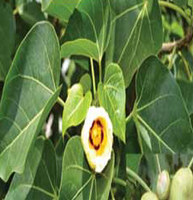
- English : Portia tree, Umbrella tree
- Gujarati : Paaraspipalo
- Hindi : Paaraspipal
- Kannada : Huvarasi
- Malayalam : Punavasu, Pupparutti
- Marathi : Parasa pimpala
- Tamil : Chilanti, Puvarasu
- Telugu : Gangaraavi, Munigangaraavi
Medicinal Uses
- Wound: The leaves paste of parisha externally applied as a bandage over the wound is good for healing. Bark decoction is also used to clean the wounds.
- Scabies: Paste of flowers of parisha is applied over skin diseases like pruritis and scabies.
- Joint pains: Leaves paste of parisha and little castor oil are fried in pan. Applied this poultices over the inflamed joints to get the relief from joint pains.
- Leucoderma: Paste prepared from bark powder of parisha and cowʼs urine, is applied externally over leucoderma to get the normal colour of the skin.
- Jaundice: The bark decoction of parisha (5 gms of bark cooked in 100ml of water and reduced it into 25ml) is given internally twice a day for ascites and Jaundice.
Parnabija
Scientific name : Bryophyllum pinnatum
Family : Crassulaceae
Vernacular name
- English : Good luck leaf, Life plant, American Life Plant, Miracle Leaf
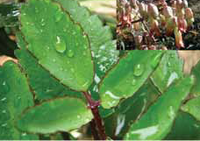
- Hindi : Patharchattam, Patharchur, Pather Chat,
- Bengali : Koppat, Patharkuchi, Gatrapuri, Kaphpata, Koppata, Pathorkuchi
- Kannada : Kaadubasale, Dadabadike, Patrajeeva
- Malayalam : Elachedi, Elamulachi, Ilamarunnu, Ilamulachi
- Telugu : Ranapala
- Tamil : Runa kalli, Ranakkalli
- Unani : Zakhm-hayaat, Zakhm-eHayaat, Pattharchoor, Pattharchat.
Medicinal Uses
- Urinary calculi: 10 gms of parnabija leaves in 100ml of water, take twice a day. You can also give the decoction with 500 mg shilajit and 2tsf of honey mixed in it for more effective.
- Boils: Slightly warm parnabija leaves and crush them. Tie it as poultice and applied on the affected area to cure boils, redness and swelling too.
- Wounds: Slightly warm the parnabija leaves and then crush them and tie on the wound. It helps the wound heal faster and also eliminates the scar. It also bring relief from insect bites, bruises, boils, and also skin ulcers
- Bleeding diarrhea: Administration of 3-6 gms juice of parnabija leaves with cumin seeds and double quantity of ghee, thrice a day controls the blood flow in diarrhea.
- Cold: Administration of 5 ml juice of parnabija three times a day is beneficial in cold.
- Joint pains: Grind 7 fresh leaves into a poultice. Apply the poultice evenly to the affected area twice a day, morning and night, as often as needed to get the relief from joint pains.
Parnayavani (Karpooravalli)
Scientific name : Coleus amboinicus
Family : Lamiaceae
Vernacular name
- English : Cuban Oregano, Indian borage, Indian mint, Mexican mint
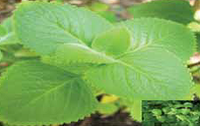
- Hindi : Patta ajwain
- Marathi : Pathurchur
- Tamil : Karpuravalli
- Malayalam : Panikkurkka, Kannikkurkka
- Telugu : Karpoora valli, vamu aaku
- Kannada : Karpurahalli, dodda pathre, dodda pathre soppu
Medicinal Uses
- Cough: Paste prepared from 5 leaves of karpooravalli and 10 leaves of tulasi is boiled in 100 ml of water for 5-10min. Cool the water and add one teaspoonful of honey. Intake of this mixture will give a relief from dry cough. Intake of fresh leaves (3 or 4) along with pepper, will also give a relief from cough and cold.
- Abdominal colic: 4 leaves of parnayavani crushed and put in to 20ml of hot water. Intake of this water frequently will cure the stomach ache.
- Mosquito repellent: Leaves of parnayavani crushed and placed in a room will act as a natural mosquito repellent. Or Make a paste of ajwain seeds and leaves with mustard oil and place this paste in room corners will prevent the entry of mosquitoes in room.
- Asthma: Boil hand full of Karpooravalli seeds and leaves in water and inhale the vapour to control asthma effectively.
- Acne: External application of leaves paste mixed with curd is highly beneficial in removing acne effectively.
- Chest congestion: Take equal quantity of karpooravalli juice and honey, add a pinch of dry ginger powder, a pinch of fresh pepper powder. Mix well and take internally twice a day to relieve chest congestion.
- Insect bites: Karpooravalli can be used for bee stings and insect bites. Crush the leaves and apply on the affected area of the skin.
Pippali
Scientific name : Piper longum
Family : Piperaceae
Vernacular name
- Assamese : Pippali
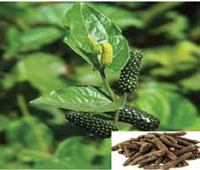
- Bengali : Pipul
- English : Long Pepper
- Gujarati : Lindi Peeper, Pipali
- Hindi : Pipar
- Kannada : Hippali
- Malayalam : Pippali
- Marathi : Pimpali, Lendi Pimpali
- Oriya : Pipali, Pippali
- Punjabi : Magh, Magh Pipali
- Tamil : Arisi Tippali, Thippili
- Telugu : Pippalu
- Urdu : Filfil Daraz
Medicinal Uses
- Cough: Pippali powder 2-3 grams is mixed with honey and licked. This helps to pacify cough, cold, sore throat etc.
- Hoarseness of the voice: 10-20 ml of Pippali decoction is administered twice or thrice daily in case of indigestion, poor appetite, cold, hoarseness of the voice, rhinitis etc.
- Intestinal worms: Pippali, cumin, black pepper and Vidanga (Embelia ribes) are taken in equal quantity and fine powder is made. This is administered in the dose of 3-5 gram twice or thrice a day. This is very effective against intestinal worms and colic pain.
- Chronic fever & splenomegaly: Internal administration of Pippali powder 3 gms mixed with honey twice daily after food. It has significant benefits on low digestion, diarrhea, fever, lack of strength, splenomegaly and loss of appetite.
- Piles: The use of butter milk kept in a vessel anointed internally with the paste of pippali, pippalimula, cavya (Piper chaba), vidanga (Embelia ribes), sunthi (Zingiber officinale) and haritaki (Terminalia chebula) is wholesome.
- Toothache: Pippali powder mixed with honey should be kept in mouth. It is excellent remedy for toothache.
Punarnava
Scientific name : Boerhaavia diffusa
Family : Nyctaginaceae
Vernacular name
- Assamese : Ranga Punarnabha
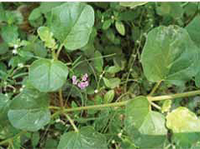
- Bengali : Rakta punarnava
- English : Horse Purslene, Hog Weed
- Gujarati : Dholisaturdi, Motosatodo
- Hindi : Gadapurna, Lalpunarnava
- Kannada : Sanadika, Kommeberu, Komma
- Kashmiri : Vanjula Punarnava
- Malayalam : Chuvanna Tazhutawa
- Marathi : Ghetuli, Vasuchimuli, Satodimula, Punarnava, Khaparkhuti
- Oriya : Lalapuiruni, Nalipuruni
- Punjabi : ltcit (Ial), Khattan
- Tamil : Mukurattai (Shihappu)
- Telugu : Atukamamidi, Erra galijeru
Medicinal Uses
- Dysuria and urinary obstruction: The roots of Punarnava(15-20 gram) is taken and decoction is made and consumed in the dose of 30-40 ml twice or thrice a day. This is effective in the conditions like dysuria and urinary obstruction.
- Indigestion: 20-30 ml of fresh juice is obtained from the whole plant of Punarnava with pinch of black salt is taken internally. This is effective in abdominal distention, acid belching and burping.
- Urinary calculi: Fine powder (1-2 gram) of Punarnava seeds or its decoction (30-40 ml) is taken regularly for a period of 10-12 days. This helps to flush out the urinary calculi of 5-8 mm size.
- Recurrent UTI: Punarnava, Tribulus (go kshura) and coriander (dhaniya) are taken in equal quantities. Decoction or hot infusion is prepared. This is administered twice or thrice daily. It is very effective against the burning, micturition dysuria and in urinary tract infections.
- Pedal oedema: Whole plant is made into fine paste and warmed a little. This is applied to the extremities where the swelling is found. Regular application reduces the swelling.
- Anaemia: The Leafy vegetable of Punarnava is particularly effective in Anaemia and Oedema.
- Eye disease: Freshly obtained leaves are made into fine paste and applied over closed eyes. This brings cooling effect to the eyes.
Rajaudumbara
Scientific name : Ficus carica
Family : Moraceae
Vernacular name
- English : common fig
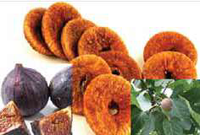
- Hindi : Anjeer
- Marathi : Anjeer
- Malayalam : Atti Pazham
- Tamil : Semaiyatti
- Telugu : Athi Pallu , Bodda
- Kannada : Anjura
- Urdu : Anjeer
Medicinal Uses
- Mouth ulcer: 30gms of bark coarse powder boiled in 200ml of water till the mixture is reduced to 1/4th. The filtered decoction of this mixture is used for mouth gargling (rinsing), 3-4 times in a day. This helps to cure mouth ulcers and stomatitis.
- Pharyngitis: 1- 2 Tender leaves chewed of anjeer and retained in the mouth for 10 minutes then spit it out. This helps to pacify the sore throat and pharyngitis
- Acid peptic disorders: 20gms of bark powder boiled in 100ml of cowʼs milk and till the mixture reduced to 50ml . Consuming this milk early in the morning will pacify Gastritis and acid peptic disorders.
- Hiccup: 5 Mature fruits pulp of anjeer is added in 100ml of milk and blend in a mixer grinder to prepare milk shake (by adding little sugar or jaggery). This thick milk juice orally taken once in a day is beneficial relieve hiccup.
- Urinary Calculi: Boil 6 anjeer fruits in a cup of water for 5-10minutes. Consuming this water early morning daily for a month is useful to remove Kidney stones.
- Acne: Apply mashed fresh figs all over the face and let it dry for 15-20min and wash with normal water. Regular application of this paste is useful to cure acne.
Sadapushpa
Scientific name : Catharanthus roseus
Family : Apocynaceae
Vernacular name
- English : Periwinkle, Madagascar periwinkle, Vinca
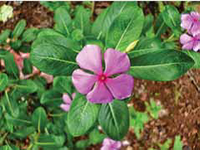
- Hindi : Sadabahar
- Malayalam : Shavam Naari
- Marathi : Sadaphuli
- Bengali : Nayantara
- Tamil : Nithyakalyani, Sudukattu Mallikai
- Telugu : Billaganneru
Medicinal Uses
- Wounds: The leaves of Sadapushpa with turmeric paste is applied on the wounds 2 to 3 times a day. This serves as a good wound healer.
- Urinary disorders: 250-500 mg of root powder is taken along with honey. This has potent effect in Urinary disorders .
- Irregular menstruation: 6 to 8 fresh leaves of the plant are boiled in 200ml of water till it reduced to ¼ th . This is taken regularly for three consecutive menstrual cycles twice daily. This controls the heavy menstrual flow and regularizes scanty flow too.
- Nasal bleeding: Equal quantity of juice of Sadabahar flower and pomegranate tender buds are instilled to the nostrils (3drops in each nostril) in case of nasal bleeding.
- Insect and wasp bites: Fine paste of the leaves applied over the bite area of the insects and wasps to reduce the irritation and swelling.
- Acne: Equal quantity of fresh leaves of vinca and neem and turmeric fresh rhizome are made into a fine paste and is applied over the acne lesions and skin scars. Regular application gives excellent results in this condition.
Source: Ayurveda offering Herbal healing
Last Modified : 3/2/2020
